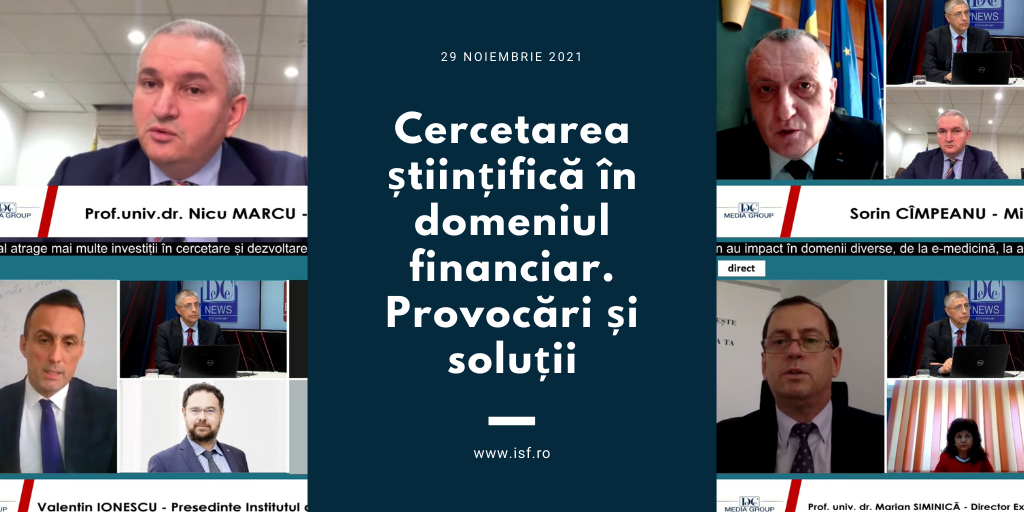PRESS RELEASE
ISF Conference: Private Scientific Research Needs Support to Develop in Romania
Research, Development, and Innovation represent sectors that require greater involvement from both the state and the private sector in Romania. Financial allocations in this field must increase to reach 2% of GDP (combined public and private funding), and private investments in this direction could be encouraged through tax incentives and benefits, concluded the debate titled "Scientific Research in Finance: Challenges and Solutions," organized on Thursday, October 28, by the Institute of Financial Studies (ISF). The event aimed to foster an exchange of ideas among representatives from academia, public authorities, and the business environment to analyze the current state of scientific research applicable to finance.
The debate featured key speakers, including Prof. Nicu Marcu, President of the Financial Supervisory Authority; Prof. Sorin Cîmpeanu, Minister of Education; Prof. Nicolae Istudor, Rector of ASE Bucharest; Prof. Marilen Pirtea, Rector of the West University; Academician Lucian Albu, President of the ISF Scientific Council; Alexandra Smedoiu from Deloitte Romania; Valentin Ionescu, ISF President; Adrian Codîrlaşu, Credit Risk Support Director at UniCredit Bank; Prof. Marian Siminică, Executive Director of ISF; Prof. Mihaela Onofrei, UAIC Prorector; and Mirela Păun, Director of INCDSB Bucharest.
“It is time to establish conditions for private scientific research in Romania,” stated Nicu Marcu, President of the Financial Supervisory Authority.
"Although our country has committed at the European level to allocate a minimum of 1% of GDP for research funding, this has yet to be achieved. Research institutes face significant challenges in financing their activities, and now may be the time to create the necessary conditions for private research! We must stimulate the share of private research in GDP! One solution to encourage this could be providing tax deductions for private companies that develop in-house research departments. I believe it is an opportune moment for research and education to receive a budget commensurate with the importance of these sectors,” said Nicu Marcu.
He also emphasized that scientific research in finance must address the digital demands of Industry 4.0 as the cornerstone of its theoretical framework.
“The alliance between technology and finance enhances both the comprehensive and normative aspects of academic research in finance. Thus, the digitalization of financial services and the data processing it entails allow us to understand the socio-economic limits of macroeconomic projections while also providing the theoretical frameworks for a proactive approach to the global economic future,” explained Nicu Marcu.
Additionally, Marian Siminică, Executive Director of ISF, highlighted that underfunding in the research sector leads to lost opportunities.
“There is a strong link between scientific research and economic growth. It is challenging for a scientific research project to be financed through bank loans, as there is a high risk of 'failure in research.' If we invest 100 lei in research activities, not all of that amount will yield immediate effects. However, the part that produces applicable results has an exponential multiplier effect, and the investment is recovered tenfold. Hence, state involvement is crucial. Research in finance significantly contributes to financial markets: it generates and disseminates new information; it studies consumer behavior; it identifies trends in the market, etc. By disseminating the results, it enhances financial literacy. State intervention is essential in this equation. The state must provide the necessary infrastructure and framework for collaboration between research entities and the private sector through fiscal levers or financial incentives. Furthermore, the state should at least partially assume the risk of research failure,” explained Marian Siminică.
These messages were echoed by Minister of Education Sorin Cîmpeanu, who pointed out that funding for R&D is on a downward trend, reaching only 0.13% of GDP in 2020. He also emphasized the importance of research in the financial sector.
“The role of financial systems should be rethought. This is where financial research comes into play. Interdisciplinary and transdisciplinary approaches from psychology, sociology, and communication sciences are needed. I see all these disciplines integrated into financial studies. This way, we could obtain well-founded insights into investor behavior and that of the general population,” said Sorin Cîmpeanu, Minister of Education, who was present at the conference.
Valentin Ionescu, President of ISF, spoke about the changes needed in education as the market transitions to a digital economy. He believes that educational methodologies must shift from convention to innovation.
“These technologies contribute to personalized learning by utilizing artificial intelligence algorithms in education, which have the potential to empower students and lead to the customization of curricula to meet individual needs. By comprehensively analyzing students' learning methods and historical study behavior, learning analysis can be applied to the collected data. Furthermore, blockchain technologies used in financial markets for cryptocurrencies, such as distributed ledgers, can also be applied in education. Their role would be to maintain records and certify the validity of presented diplomas. No one would be able to forge a diploma any more than they could forge a transaction in a stock market if this distributed ledger technology were implemented,” stated Valentin Ionescu.
About ISF
The INSTITUTE OF FINANCIAL STUDIES (ISF), founded by the Financial Supervisory Authority, is a center of excellence in studying financial markets and running financial education programs to ensure the competencies, skills, and knowledge of personnel in financial institutions and ASF staff, as well as to increase the financial literacy of consumers of non-banking financial services and products. In the long term, ISF aims to align its activities with European requirements, shifting from knowledge accumulation to competence accumulation and assessment, providing training programs for the non-banking financial sector adapted to new organizational processes determined by legislative requirements, market dynamics, and the European framework, contributing to the maturation of the non-banking financial market in Romania and enhancing its capacity to face competition induced by globalization or the effects of economic crises.

